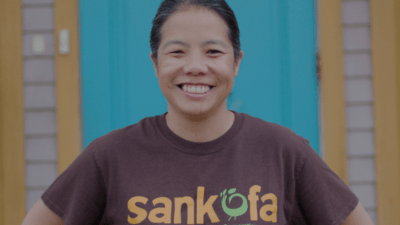In the face of ongoing inflation and the threat of a national recession, food assistance programs are one of the most keenly necessary resources to protect children and families in need. Yet researchers from the University of Michigan, supported by the W.K. Kellogg Foundation, found that these programs are often designed without input or feedback from the very families they are intended to help.
In 2020, as the pandemic began, epidemiologists and nutritionists alike were concerned about the families facing hunger as schools and early care centers closed and businesses shuttered. Yet Kate Bauer, associate professor of nutritional sciences at U-M’s School of Public Health, noticed something strange. Federal funds were expanding food assistance; families were reporting they didn’t have enough; but those same expanded programs were reporting they weren’t being used as much as they could be. How was the need still ongoing? One answer, her research team found, was that what families needed wasn’t what was being provided. Food assistance programs were being developed and carried out without talking to the people who needed them.
With support from WKKF, Bauer assembled a team to launch Feeding MI Families to support the creation of food security policy and program recommendations that are grounded in racial equity and shaped by parent voice. Parents from major Michigan cities – Detroit, Grand Rapids and Battle Creek – who had themselves experienced food hardship were engaged and trained in advocacy and community-based research.
Two Parent Leadership Boards with a total of 25 members have formed and meet bimonthly. One board includes parents from Detroit, Grand Rapids and Battle Creek and operates in English; the other includes parents from Detroit and operates in Spanish.
As Feeding MI Families continues its work, these same parents are now interviewing others. Survey and interview recruitment help has been offered by statewide and local organizations, including MSU Extension, Gleaners, NAACP Battle Creek, and the Detroit Food Policy Council. In the upcoming weeks, 750 families will be surveyed to document their knowledge and their ideas for an improved system. The latest surveys will focus on the impact of racism and discrimination in food access and assistance among urban families – many of whom are Black, Latinx and Middle Eastern, and also among new immigrant families. The goal is to develop parent-driven recommendations for food assistance that will lead to the eradication of childhood hunger.
Hungry families aren’t just a problem in urban areas. The Michigan Farm Bureau recently announced it will be working with Bauer to apply the strategies to solicit parent voice developed in the urban research to Michigan’s rural counties, including every county in the Upper Peninsula and northern lower Michigan.
“Many Michigan families are still struggling, perhaps even more so than during the early days of COVID-19. The pandemic is ongoing, the federal aid mostly gone, and food prices and gas prices continue to climb,” Bauer said. “Many parents are talking about the current ‘food crisis,’ which they do not expect will end anytime soon. In partnership with the Kellogg Foundation and Michigan Farm Bureau, Feeding MI Families is helping us understand how to move forward and best meet these families’ needs.”
Learn More
- Stateside Podcast: Accessing baby formula in Michigan, Michigan Radio, June 7, 2022
- U-M, Farm Bureau working together to reduce hunger in Michigan, University of Michigan School of Public Health, July 20, 2022
- MFB announces focus on eradicating childhood hunger, partnership with U-M to fight food insecurity, Michigan Farm Bureau, August 4, 2022








Comments